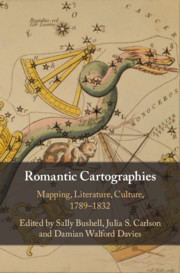Book contents
- Romantic Cartographies
- Romantic Cartographies
- Copyright page
- Contents
- Illustrations
- Notes on Contributors
- Preface
- Acknowledgements
- Introduction Romantic Cartographies
- Part I Romantic Maps, Romantic Mapping
- Part II Cartographic Encounters
- Part III Beyond Romantic Cartographies
- Chapter 9 Deep Mapping and Romanticism
- Chapter 10 Unmapping John Clare
- Chapter 11 The Problem of Precedent
- Chapter 12 Maps without Territory
- Bibliography
- Index
Chapter 10 - Unmapping John Clare
Circularity, Linearity, Temporality
from Part III - Beyond Romantic Cartographies
Published online by Cambridge University Press: 15 January 2021
- Romantic Cartographies
- Romantic Cartographies
- Copyright page
- Contents
- Illustrations
- Notes on Contributors
- Preface
- Acknowledgements
- Introduction Romantic Cartographies
- Part I Romantic Maps, Romantic Mapping
- Part II Cartographic Encounters
- Part III Beyond Romantic Cartographies
- Chapter 9 Deep Mapping and Romanticism
- Chapter 10 Unmapping John Clare
- Chapter 11 The Problem of Precedent
- Chapter 12 Maps without Territory
- Bibliography
- Index
Summary
The chapter seeks to problematize what it means to ‘map’ literature in the late twentieth and early twenty-first centuries through the example of Romantic poet John Clare. The first half of the chapter rereads Clare through one critical and two creative interpretations of his sense of place and space, by John Barrell, Franco Moretti, and Iain Sinclair. Reading Clare in, and through, others generates a multilayered response that highlights the range of spatial forms of interpretation embraced by literary studies whilst also critically interpreting both maps and texts used in those arguments. The second half of the chapter offers a fresh reading-as-mapping of Clare by prioritizing time over space, drawing upon a concept articulated by French historian Pierre Nora, that of lieux de mémoire (sites/realms of memory). Nora’s model of the loss of shared, lived history and its memorialization in fixed sites is applied to Clare to enable a move from a focus on the predominantly spatial to the spatio-temporal. Does the concept of lieux de mémoire only work at a macro level, or can be localized in an individual? This section seeks to come at place through the memory that it embodies.
- Type
- Chapter
- Information
- Romantic CartographiesMapping, Literature, Culture, 1789–1832, pp. 232 - 251Publisher: Cambridge University PressPrint publication year: 2020



